
Are you interested in using SEO to build your brand? Or do you want to use SEO to get more leads and sales?
Most importantly do you want to avoid the common mistakes that hold back rankings?
Well today, I thought I would do something a bit different.
I wanted to break down how you can get a crash course in SEO.
Best of all I wanted to do so without you having to spend a dollar.
Today we are going to examine 10 guides and 5 courses that you can rely on to improve your SEO knowledge. Although some guides and courses have a similar title and focus, the information and advice provided in each one are both unique and valuable.
Let’s get started!
10 SEO Guides
1. SEO Made Simple (A Step-by-Step Guide) – Are you new to the world of SEO? In this case, a beginner’s guide is exactly what you need (more of these to come).
This is why I wrote this guide:
- It truly is for beginners, leaving advanced technical details out of the equation.
- It’s broken down into easily digestible sections, with each one providing a primary focus.
- It’s full of screenshots, videos, images, and infographics, all of which paint a clearer picture of what is needed to succeed.
2. SEO Periodic Table – This guide is a little bit different than most. It’s more in a visual format where it breaks down the elements of SEO.
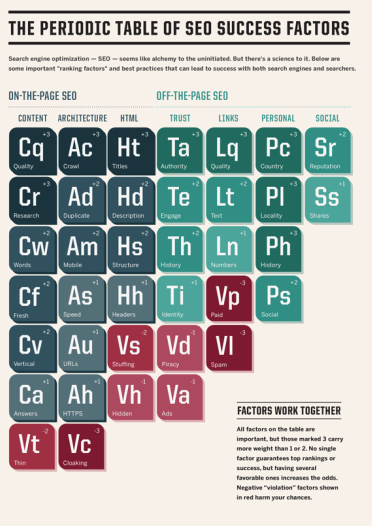
It’s important to know each factor that can impact SEO because every little bit adds up.
Unlike other marketing channels, SEO is one where you have to do a lot of little things right to get traction.
3. Search Engine Optimization Starter Guide – If you could learn SEO from one person or company who would it be? Most people will overlook the obvious answer: Google.
Everybody wants to rank higher in Google. After all, it’s the search engine of choice for the majority of the world.
If you are new to SEO and you want to learn from the top dog, this starter guide will be your new best friend.
The primary benefit of this guide is that you don’t have to worry about whether or not the information is accurate. You know that every point of advice is spot on, being that it comes from the master of all search engines.
With 32 pages of advice, ranging from SEO basics to mobile optimization, there is a reason why so many new marketers keep this guide close by at all times.
Just because you are new to SEO does not mean that you can afford to make mistakes. Google’s Search Engine Optimization Starter Guide helps you get up and running in a fast, efficient, and effective manner, all while avoiding common mistakes that have plagued millions before you.
4. The Beginner’s Guide to SEO – Moz created one of the first guides ever on SEO. And they tend to update it every year as well.
There are 10 chapters that make up this in-depth guide, starting with “How Search Engines Operate” and leading to “Measuring and Tracking Success.”
In between, you will pick up advice on why search engine marketing is important to your business, how to build links without being penalized, and common myths and misconceptions about SEO.
You can read the guide online or download the PDF.
The Beginner’s Guide to SEO deserves to be read from start to finish. Even if you have some knowledge of SEO, this guide can help sharpen your skills.
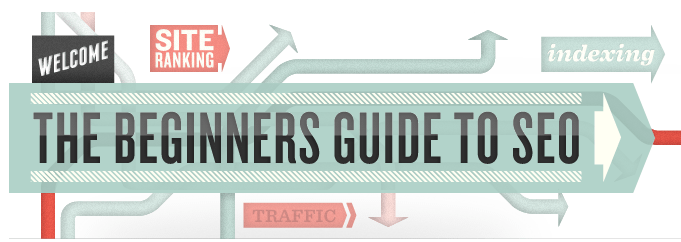
5. The Blogger’s Guide to SEO – No two people share the exact same goals for their website. For example, a blogger may not take the same approach to SEO as an e-commerce store.
And with over a billion blogs on the Internet you should know SEO when it comes to blogging specifically.
SEOBook goes above and beyond in providing information solely for bloggers.
Make sure you also read the section on “Why Blogs Are Different Than Static Websites.”
You may already know the difference, but those who are new to this may be confused. Here is an excerpt from the section, showing the targeted yet simplified nature of the guide:
SEO for a blog is different than SEO for most other websites, largely because of the social elements baked into blogging technology. SEO for blogs is more focused on giving people something to talk about and creating something worthy of attention.
As a blogger interested in SEO, you want to rely on advice that most closely matches your wants, needs, and goals. This is why this guide from SEOBook is a must-read. It’s meant to give your blog’s SEO a shot in the arm.
6. Everything You Need to Know About SEO – You won’t be an SEO beginner forever. When you are ready for the next step, this advanced SEO guide is a good place to start.
Here is how I describe the guide:
The Most Extensive and Detailed Guide of Advanced SEO Techniques That Exists Today.
Every guide on this list is solid. Every guide should be read, when you have time because the information is presented in a unique manner.
But when it comes to the most in-depth and actionable information on advanced SEO techniques, I think this guide takes the cake.
It’s not so much about the length (nine chapters), as it’s about the depth and use of examples. Here is what I mean:
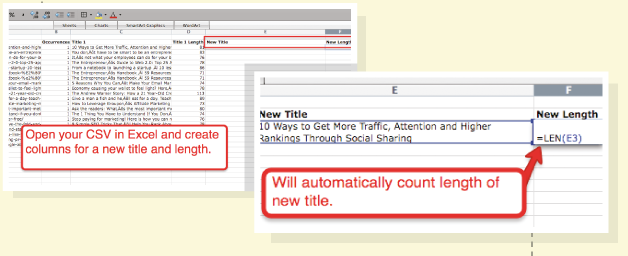
The guide doesn’t just tell you to create an SEO-friendly title. It doesn’t just tell you how long your title should be. It gives you actionable advice on how to make changes for the better. On top of that, the screenshots give you a “visual” on exactly how you can make this happen.
There is a lot to learn when you get into the advanced details of SEO. This guide makes sure that you don’t overlook something that could make or break your rankings.
7. The Complete List of Google’s 200 Ranking Factors – I mentioned above how in SEO you have to do every little thing to get rankings.
It isn’t enough to just build links.
It isn’t enough to just writing amazing content.
It isn’t enough to just optimize your meta tags.
See, everyone is doing the main aspects of SEO. But what most site’s aren’t doing is every little thing correctly.
Now just imagine if you did every little thing correctly? Your rankings would be much higher.
I recommend that you go through each of the 200 ranking factors.
8. The Ultimate Guide to Ecommerce SEO – ecommerce sites are very different than traditional sites.
The pages you want ranking high on Google typically are listing pages or product pages. Because these are the type of pages that will drive you sales.
What’s unique about this guide is it teaches you everything you need to know about SEO for ecommerce sites. Because link building, content creation, schema markup, and even optimizing for load time are all different on ecommerce sites.
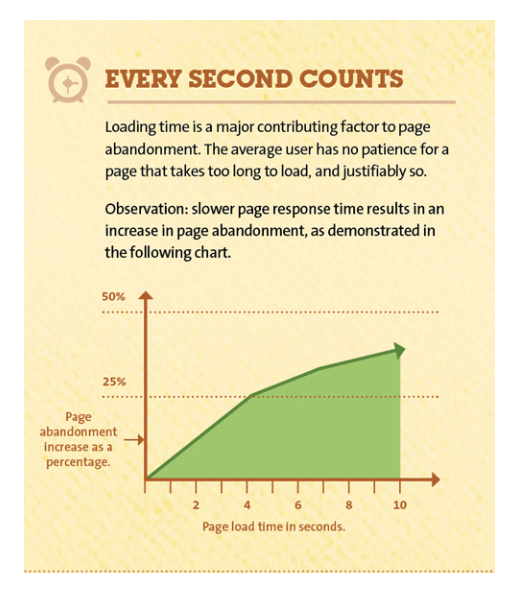
Also it works for all platforms. It doesn’t matter if you use Shopify or Bigcommece or even Wix, it works for all of them.
9. 19 Advanced SEO Techniques to Double Your Search Traffic – As I’ve mentioned above a few times, every little thing adds up with SEO, especially because it is so competitive now.
Just doing the basics isn’t enough. You have to go well above and beyond your competition.
That’s why I would read this guide that breaks down 19 advanced tactics.
Each of those tactics are very effective in increase your SEO traffic, but before you implement them you’ll want to consider doing the basics.
Because without doing the basics, the advanced tactics won’t have much use.
For example, if your URLs aren’t SEO friendly, which is a beginner’s tactic, Google may not be able to crawl your site. So no matter what advance strategy you use, it wouldn’t have much of an effect.
10. Link Building Resources That Work – links are the cornerstone of SEO. Think of them as votes.
The more votes someone gets, the higher they will rank.
But not all votes (links) are equal. Ones from authoritative sites like CNN or Yahoo have more effect. And the more related a link is to your site, the better off you are.
So how do you get links when you have little to no resources or money to spend on a big SEO firm?
Well, this guide breaks it down. It goes over all the different ways you can build links.
From creating free tools, to writing guides, to even doing manual outreach… There are many possibilities and you’ll be able to learn them all from this guide.
5 SEO Courses
1. SEO Unlocked – This is a 7-week course on SEO. But don’t be scared, by the 7-week number, each video is short and actionable.
You’ll find a total of 21 videos broken down over 7 weeks. Each video ranges in length from 5 to 15 minutes.
And accompanied with each video is cheatsheets, worksheets, and templates to make SEO easier to implement.
That way after you learn a specific SEO tactic or strategy, you’ll be given documentation on how you can use it and implement it.
2. Ecommerce SEO 101 Video Series – Here’s an SEO course from the largest ecommerce platform, Shopify.
This isn’t a course for just someone with a general interest in SEO. It’s a course for online store owners who want to improve rankings as a means of driving traffic to increase revenue and profit.
There are seven videos in the course, all of which are free to watch. Some of my favorites include:
- Why is Your Store Not on Google?
- How Does Google Rank Your Ecommerce Store?
- Keyword Research: Which Search Phrases Should You Rank For?
The videos aren’t so long that you get bored, but they are long enough to provide an inside look at the subject matter.
Online store owners understand that the difference between success and failure can rest solely on their ability to generate organic traffic. If you want to improve this area of your e-commerce business, the Shopify video series is a good jumping-off point.
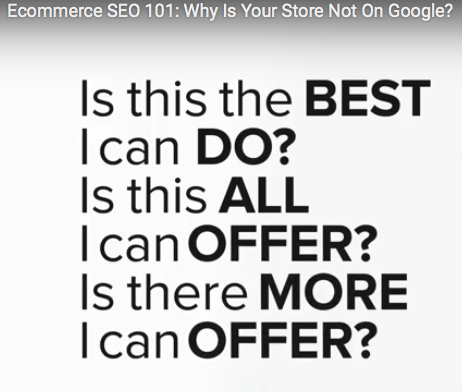
3. SEO Training Course by Moz – Moz once again finds itself on the list, this time with a training course offered through the Udemy platform.
This free training course teaches the tips and tricks that you need to implement a successful SEO strategy.
Think of this course as an extension of the company’s beginner’s guide to SEO. With five lectures and more than one hour of video content, you’ll leave the course feeling better about how to rank your website.
The titles of the lectures are as follows:
- Building a Monthly SEO Action Plan
- 5 Ways to Use Your Social Profiles for SEO
- Keyword Targeting gets Tough!
- Link Building with Twitter
- Mapping Keywords to Content
This course is designed for marketers of all levels, so take the time to sign up and dive in. It’s free, so you really have nothing to lose.
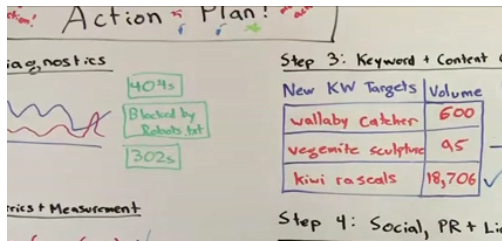
4. Free Download: On-Page SEO Template – It’s hard to categorize this as a traditional course, but it definitely fits the mold in some ways.
The On-Page SEO Template is available for free from HubSpot. It was designed with the purpose of helping marketers track on-page SEO elements.
With the template, you will have an easier time:
- Tracking changes in one place.
- Organizing your on-page SEO strategy.
- Implementing SEO elements that drive results.
- Coordinating keywords and pages without confusion.
As a free download, you should at least see if this template from HubSpot can provide you with any SEO value. You will probably find that it’s good to keep nearby as you make on-page changes.
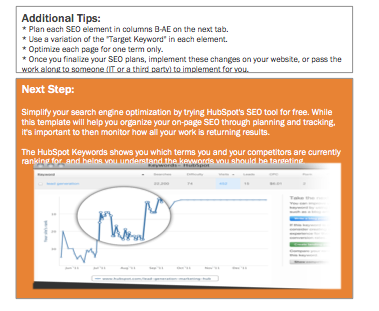
5. Local SEO Unlocked – If you are a local business this course is perfect for you. It breaks down local SEO down into 2 weeks.
The course contains 6 videos as well as worksheets, cheatsheets and templates so you can implement what you have learned.
And similar to SEO Unlocked, each video is short and to the point.
Here’s an overview on what you’ll learn:
- Overview – an overview of local SEO.
- Local SEO signals – what impacts local rankings.
- Google My Business – how to use it to rank higher on Google.
- Content – how you can create local content that ranks.
- On and Off-Page SEO – the main elements of SEO that you need to optimize for.
- Secret Recipe – the key ingredient to ranking well on Google.
SEO Tools
There are a lot of SEO tools out there that can help with improve your rankings.
I maybe a bit biased because I created it, but I would start off with Ubersuggest.
The reason I would recommend it over other SEO tools because you can get started for free.
From rank tracking, to site audits to link building, to keyword research… you can do all the aspects of SEO for free.
Here’s a preview of the Ubersuggest site audit report.
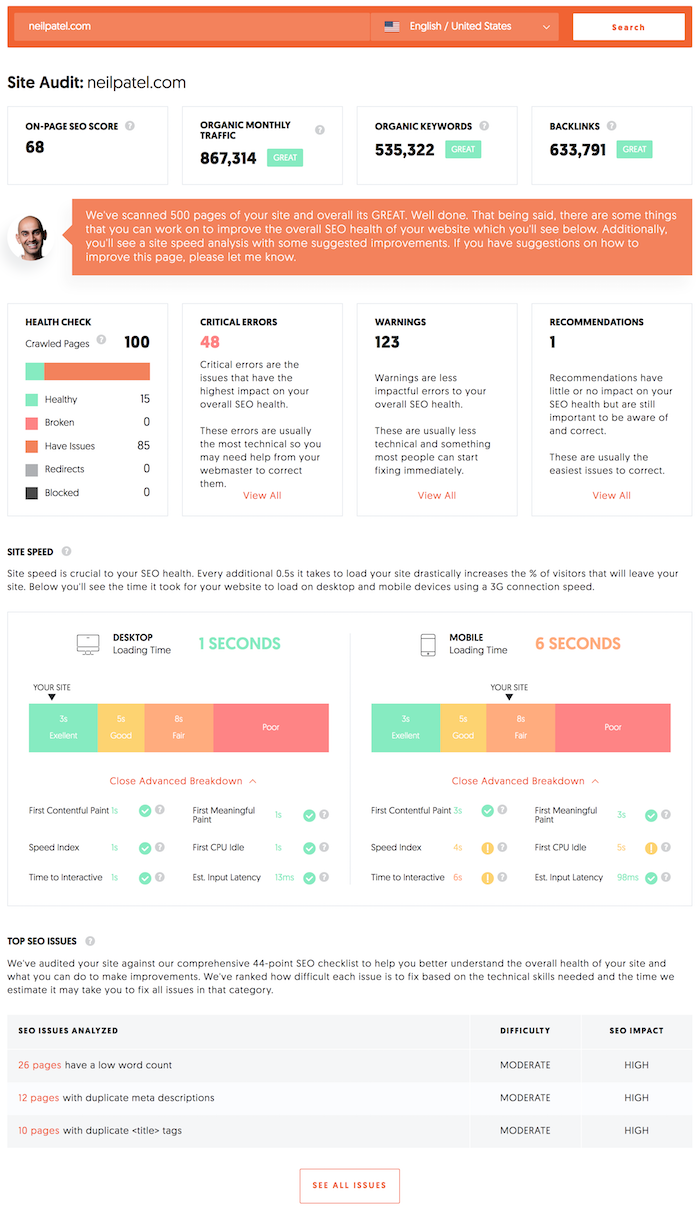
I recommend that you get started with Ubersuggest by first running a site audit. Just put in your URL here.
And after that I recommend that you create a project so you can track your SEO progress. This will allow you to track your rankings and be notified when something good or bad happens with your SEO or even when your competition does something new.
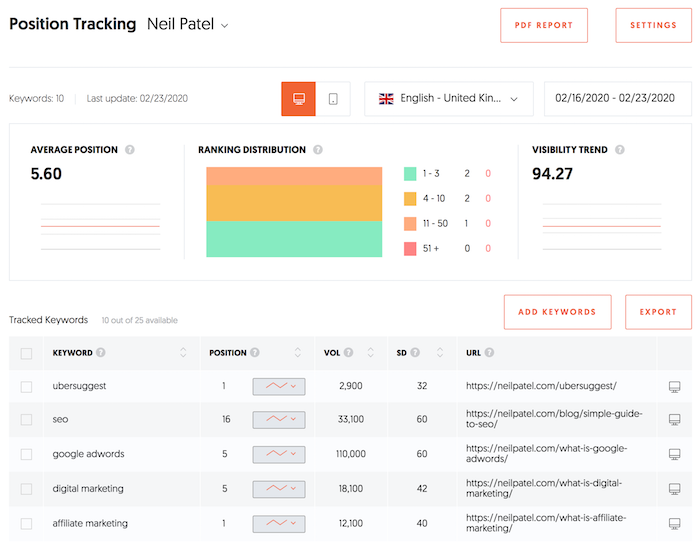
If you want to get the most out of Ubersuggest you should read this guide.
Conclusion
Even if you don’t have the time to go through everything, just pick one or two courses or guides to start off with.
Something is better than nothing. And you don’t have to do everything in a day as that would be unrealistic.
If I were you, I would start off by creating an Ubersuggest project and then go over the SEO Unlocked training course.
From there you can go over the other courses and guides in any order. But that is where I would start.
There are also a lot of paid options on the web, but I would start with the free options above as it will give you enough to start getting results.
What are your thoughts on these guides and courses?



